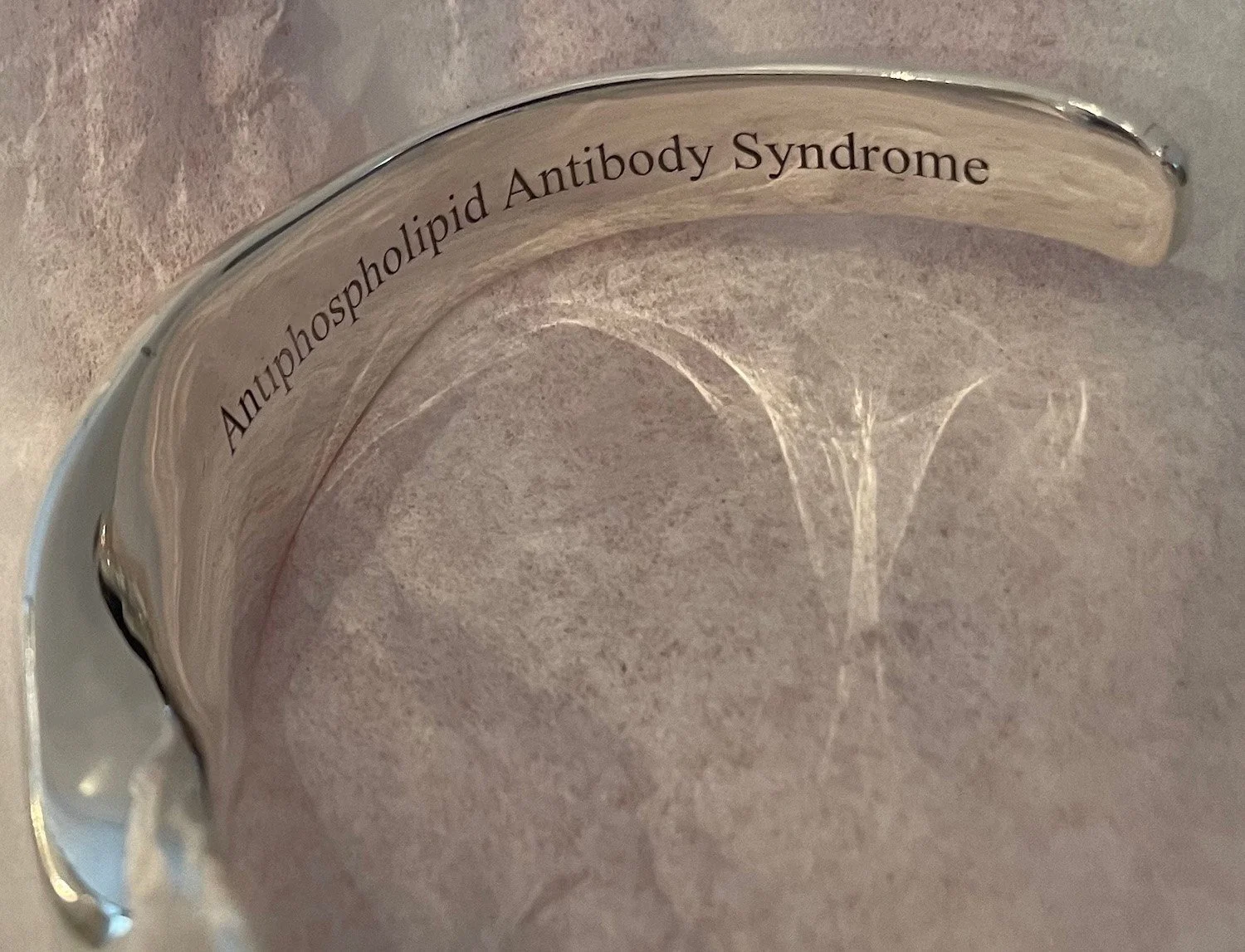Antiphospholipid Syndrome Bracelets
Antiphospholipid syndrome (APS) is an autoimmune disorder that occurs when the immune system mistakenly attacks phospholipids, a type of fat molecule found in cells and blood vessels. This can cause blood clots to form, leading to serious health complications such as stroke, heart attack, and pulmonary embolism.
Here are some reasons why you might consider wearing a medical alert bracelet if you have APS:
Communication: A medical alert bracelet can be a clear and concise way to communicate your APS diagnosis to medical professionals in an emergency situation. This can help ensure that you receive appropriate and timely medical treatment.
Safety: Blood clots associated with APS can be life-threatening if not treated promptly. Wearing a medical alert bracelet can help ensure that medical personnel are aware of your condition and can take appropriate measures to minimize your risk of developing blood clots.
Medication: If you are taking medication to manage your APS, a medical alert bracelet can provide important information about the type of medication you are taking and the correct dosage. This can be particularly important if you are unable to communicate this information yourself.
Travel: If you are traveling, wearing a medical alert bracelet can be particularly important as it can help ensure that emergency responders and medical personnel in other countries are aware of your APS diagnosis and can provide appropriate medical treatment.
When choosing a medical alert bracelet for APS, it is important to include the following information:
Your name: This can help medical personnel identify you and ensure that you receive appropriate medical treatment.
Your APS diagnosis: This can help medical personnel understand the underlying cause of your symptoms and ensure that you receive appropriate medical treatment.
Any medications you are taking: This can include information about the type of medication, the correct dosage, and any potential side effects.
Emergency contact information: This can include the name and phone number of a friend or family member who can be contacted in case of an emergency.
If you have been diagnosed with Antiphospholipid Syndrome (APS), wearing a medical alert bracelet can be an important way to communicate your condition to medical personnel in case of an emergency. This can help ensure that you receive appropriate and timely medical treatment, and minimize your risk of developing life-threatening complications associated with APS. If you have any questions about whether wearing a medical alert bracelet is appropriate for you, be sure to speak with your healthcare provider.
While APS can occur at any age, it is more commonly seen in women of childbearing age. The condition can be difficult to diagnose as it presents with a range of symptoms that can be similar to other health conditions. Some common symptoms of APS include blood clots, miscarriage or stillbirth, rash, and neurological symptoms such as seizures and cognitive impairment.
Antiphospholipid Syndrome Online Resources
APS Foundation of America, Inc.: A U.S.-based organization dedicated to raising awareness, providing support, and advancing research on Antiphospholipid Syndrome.
Lupus Foundation of America: While not exclusively focused on APS, this foundation provides information and resources about lupus and related conditions, including Antiphospholipid Syndrome.
National Institute of Arthritis and Musculoskeletal and Skin Diseases (NIAMS): NIAMS provides information about APS, its symptoms, causes, and treatment options.
Antiphospholipid Syndrome International (APS ACTION): A global network of researchers and healthcare professionals working to improve understanding and treatment of APS.
Johns Hopkins Antiphospholipid Syndrome Center of Excellence: Provides information about APS, its diagnosis, treatment, and research efforts.
MyAPS Community: An online platform that connects people affected by Antiphospholipid Syndrome, providing a space for sharing experiences and support.
APS Support UK: A UK-based organization offering information and support for individuals with Antiphospholipid Syndrome.
Antiphospholipid Syndrome Research: A research-focused website that provides information about ongoing research efforts and developments related to APS.
American College of Rheumatology (ACR): A professional organization that provides resources and guidelines for the diagnosis and treatment of APS and other rheumatologic conditions.
